|
|
|
Sort Order |
|
|
|
Items / Page
|
|
|
|
|
|
|
| Srl | Item |
| 1 |
ID:
108358
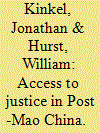

|
|
|
|
|
| Publication |
2011.
|
| Summary/Abstract |
Since the upheaval of the Cultural Revolution decade (1966-1976), post-Mao China has witnessed a sustained period of unprecedented legal reform. Criminal prosecutions and citizen lawsuits against the government, because they pit individual litigants against the authoritarian Chinese state, are two politically significant areas of law. We examine and critically assess the sociolegal scholarship on criminal and administrative legal reform as it has developed over the past few decades, with special attention to shifts in the conventional wisdom regarding legal reform and political liberalism in China and elsewhere. Additionally, we offer both theoretical and empirical suggestions for enhancing the explanatory power of sociolegal research in China.
|
|
|
|
|
|
|
|
|
|
|
|
|
|
|
|
| 2 |
ID:
098766
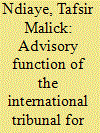

|
|
|
|
|
| Publication |
2010.
|
| Summary/Abstract |
The advisory function can be assessed as a fallback procedure at a time when there is a lack of cases before international courts and tribunals. Although not legally binding and having no precedential effect, Advisory Opinions are generally accepted. This paper looks into the question of the Advisory Opinions in the International Tribunal for the Law of the Sea (ITLOS) system. The advisory function of the Tribunal is exercised by the Seabed Disputes Chamber within the terms of the United Nations Convention on the Law of the Sea. The first request for an advisory opinion was filed on 14 May 2010. The full Court may, however, render an advisory opinion based on other international agreements according to Article 138 of the Rules of the ITLOS. As a rule, the advisory procedure is open to international organizations only. There are neither claims nor parties involved in this procedure. The paper tries to address the legal regime relating to the Opinions.
|
|
|
|
|
|
|
|
|
|
|
|
|
|
|
|
| 3 |
ID:
159465
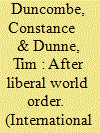

|
|
|
|
|
| Summary/Abstract |
In recent years claims about the end times of the liberal world order have gathered force, with the talk of order giving way to disruption. While there are different accounts of these disruptive dynamics and their causes, it is nevertheless a rare moment in International Relations when all mainstream theories concur that the hegemony of the liberal world order is over and that there is considerable uncertainty about the global architecture that will take its place. Yet claiming that the liberal world order is in trouble is just a starting-point—a deeper account is needed to show how each interrelated element ‘hangs together’. We examine two interrelated patterns to liberal world ordering—internationalism and imperialism. After unpacking each of these interrelated ideas which constitute liberal world order, the narrative will focus on the politics and practice of humanitarianism. Humanitarianism is, of course, deeply intertwined with liberal assumptions about an ethic of care for peoples who are either at risk of, or worse still suffering from, large-scale natural disasters and politically-induced atrocities. Our inference is that the condition of humanitarianism provides a good indication of the state of the liberal world order—its limits and possibilities.
|
|
|
|
|
|
|
|
|
|
|
|
|
|
|
|
| 4 |
ID:
097149
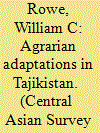

|
|
|
|
|
| Publication |
2010.
|
| Summary/Abstract |
In Central Asia, agriculture and water management have ranked as the two most important economic activities in this arid environment. These activities gained even more prominence during the Soviet era as planners expanded irrigation into previously marginal land that bolstered their vision that the best land be allocated exclusively for cotton production. In the wake of the fall of the Soviet Union, Tajikistan has enacted laws meant to expand and clarify land use categories to meet the dual targets of expanding food production within the country while maintaining as much land as possible in cotton production - their economic mainstay. To this end, the Tajik government instituted five categories of land tenure. Though comprehensive, these new dispositions merely mask a continuation of top-down agrarian decision making implemented during the Soviet period. Consequently, this change has created new problems for farm labourers as they struggle to adapt to post-Soviet life and negotiate with the new bureaucracy in the face of 'de-modernization' and the loss of jobs, wages, and in many cases, access to productive land. This research demonstrates that the means by which the Tajik government expanded food production has contributed to agricultural problems apparent at the time of independence.
|
|
|
|
|
|
|
|
|
|
|
|
|
|
|
|
| 5 |
ID:
092499
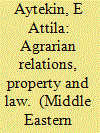

|
|
|
|
|
| Publication |
2009.
|
| Summary/Abstract |
Contrary to the prevalent tendencies of 'state-centrism' and legal formalism in the literature, this article studies the Ottoman Land Code of 1858 not as an initiator of trends but as a product of social change. The Code recognized private property on land, enlarged liberties of landholders, and pushed inheritance rules further towards gender equality. Deeply influenced by the uneven development of the capitalist relations of production, agrarian conflict, and the complex matrix of the interests of ruling groups, Ottoman land law in the nineteenth century unmistakably evolved in the direction of modern law based on the abstract individual and full commodification of land.
|
|
|
|
|
|
|
|
|
|
|
|
|
|
|
|
| 6 |
ID:
196204


|
|
|
|
|
| Summary/Abstract |
The relationship between populism and free trade has historically been a complex one. This article argues that populism affects trade not by expressing consistent economic preferences, but by operating as a discourse that articulates external policies as a struggle for popular recognition. We analyse trade discourses of Donald Trump and Brexiteers following their victories in the 2016 United States presidential election and the referendum on European Union membership in the United Kingdom. These populist movements expressed opposing trade preferences: Trumpism was identified with protectionism, while Brexiteers supported free trade. However, they both articulated trade as a way to regain popular sovereignty from elites and hostile outsiders. A discursive approach helps identify a common logic in how populists articulate foreign relations despite pursuing nominally opposing policies. While this populist logic pertains primarily to domestic mobilization, it has implications for the international order as well, as evidenced in the persistence of protectionist instincts in the US under President Biden and the acceptance of a ‘global’ trade policy outside the EU as the new frame of reference for UK external economic relations.
|
|
|
|
|
|
|
|
|
|
|
|
|
|
|
|
| 7 |
ID:
104389
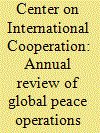

|
|
|
|
|
| Publication |
Boulder, Lynne Rienner Publishers, 2010.
|
| Description |
x, 375p.
|
| Standard Number |
9781588267375
|
|
|
|
|
|
|
|
|
|
|
|
Copies: C:1/I:0,R:0,Q:0
Circulation
| Accession# | Call# | Current Location | Status | Policy | Location |
| 055990 | 327.172/CEN 055990 | Main | On Shelf | General | |
|
|
|
|
| 8 |
ID:
165050
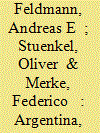

|
|
|
|
|
| Summary/Abstract |
This article examines the role of Argentina, Brazil and Chile (the ‘ABC countries’) in supporting democracy through the logic of consequences and appropriateness in three emblematic cases: the removal of President Zelaya in Honduras in 2009, the constitutional crisis that led to the removal of President Fernando Lugo in Paraguay 2012 and the sudden closing of the National Assembly in Venezuela in 2017. The authors argue that the ABC governments’ responses to governance crises have been shaped by a mixture of motivations, both instrumental (geopolitical interest or ideological affinity) and ideational (a normative preference for democracy). This mixture has resulted in inconsistent policies deriving from the mismatch between the normative commitments made by these countries, enshrined in multilateral instruments such as democracy clauses, which have often limited their room for manoeuvre, and their preference for a measured, prudent foreign policy based upon traditional principles of non-intervention. Specifically, the authors find that the ABC countries’ stance on democracy support depends on two fundamental conditions: their leverage vis-à-vis the target state and the degree of certainty regarding a potential resolution of a given democratic crisis.
|
|
|
|
|
|
|
|
|
|
|
|
|
|
|
|
| 9 |
ID:
139581
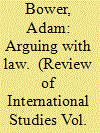

|
|
|
|
|
| Summary/Abstract |
Recent studies have highlighted the instrumental use of language, wherein actors deploy claims to strategically pursue policy goals in the absence of persuasion or socialisation. Yet these accounts are insufficiently attentive to the social context in which an audience assesses and responds to strategic appeals. I present a theoretical account that highlights the distinctly powerful role of international law in framing strategic argumentation. Legalised discourses are especially legitimate because law is premised on a set of internally coherent practices that constitute actors and forms of action. I then illustrate the implications in a hard case concerning US efforts to secure immunities from International Criminal Court jurisdiction. Contrary to realist accounts of law as a tool of the powerful, I show that both pro- and anti-ICC diplomacy was channelled through a legal lens that imposed substantial constraints on the pursuit of policy objectives. Court proponents responded to US diplomatic pressure with their own legal arguments; this narrowed the scope of the exemptions, even as the Security Council temporarily conceded to US demands. While the US sought to marry coercion with argumentative appeals, it failed to generate a lasting change in global practice concerning ICC jurisdiction.
|
|
|
|
|
|
|
|
|
|
|
|
|
|
|
|
| 10 |
ID:
081360
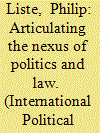

|
|
|
|
|
| Publication |
2008.
|
| Summary/Abstract |
Does law rule foreign affairs in the democratic state? Basically, one might expect that democratic executives operate on the ground of what is called the Rechtsstaat, and that in a political system with checks and balances operations-especially those eventually dropping out of that ground-are subject to judicial review. However, legal systems are more often than not willing to abstain from a legal governance of its countries' foreign policy-because of "political reasons." Moreover, democracies obviously vary according to their legal operations. At least in the area of foreign affairs, the relationship of democracy and law does not take up a necessary character. Facing this contingency, the article engages in the discursive construction of a politics and law nexus in the course of the operations of two legal systems, in the United States and Germany. For that reason, it will proceed by deconstructing two legal decisions related to the war in Iraq. Building upon the premise that legal practices are intertwined into a larger web of (legal) text, the article argues that the possibility of a judicial abstention in cases bearing reference to foreign policy issues depends on meaning produced in the course of the signification and positioning of discursive elements like "politics" and "law." Thus, speaking law is a politico-legal practice
|
|
|
|
|
|
|
|
|
|
|
|
|
|
|
|
| 11 |
ID:
157068
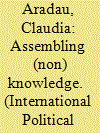

|
|
|
|
|
| Summary/Abstract |
Critical analyses of security have focused on the production of knowledge, techniques, and devices that tame unknowns and render social problems actionable. Drawing on insights from, science and technology studies and the emerging interdisciplinary field of “ignorance studies,” this article proposes to explore the enactment of non-knowledge in security and legal practices. Starting with legal challenges brought against the NSA and other intelligence agencies after the Snowden revelations about mass surveillance, it shows how different modes of non-knowledge are enacted and not just “tamed”: uncertainty, ignorance, secrecy, ambiguity, and error. The enactment of non-knowledge has important implications for how we understand security practices, the relation between security and law, and public challenges to mass surveillance in a digital world. On the one hand, the enactment of non-knowledge by security and legal professionals limits activist and NGO resistance to mass surveillance, when these are focused on claims to knowledge, disclosure, and transparency. On the other, reassembling non-knowledge and knowledge differently has generative political effects and opens new possibilities for intervention and resistance.
|
|
|
|
|
|
|
|
|
|
|
|
|
|
|
|
| 12 |
ID:
091542
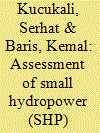

|
|
|
|
|
| Publication |
2009.
|
| Summary/Abstract |
This paper aims to evaluate the development of small hydropower (SHP) in Turkey and discusses the current situation of SHP plants in terms of government policy, economical aspects and environmental impacts taking EU policy into account. The laws published in recent years in Turkey succeeded in promoting the utilization of renewable energy for electricity generation, but it is considered that those laws are not fully compatible with EU policy. After the publication of Renewable Energy Law (Law No. 5346) there occurred a boost in SHP project along with hydropower development. Thus, the hydropower potential of Turkey increased 15% and the construction of hydropower plants also increased by a factor of four in 2007 as compared to 2006. Investment and operating costs are in favor of SHP development in Turkey as having the lowest costs among European countries (300-1000 €/kW as investment cost and 1 €cent/kWh as operating cost). Turkish governments have taken precautions for environmental issues resulted from renewable energy utilization but these are obviously not adequate. It is concluded that more attention must be paid on environmental issues and monitoring of the facilities must be enabled with further laws or regulations.
|
|
|
|
|
|
|
|
|
|
|
|
|
|
|
|
| 13 |
ID:
155479
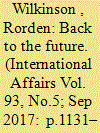

|
|
|
|
|
| Summary/Abstract |
This article reflects on the role crises play in enabling existing systems of global economic governance to evolve and endure while also preserving underlying power dynamics. The article uses as its case-study global trade governance. Its aim is to explore the impact of the negotiating crises that beset the World Trade Organization's (WTO) Doha round of trade negotiations. The article traces how, over the course of the Doha round, periodic crises resulting from divergent pressures for opposing outcomes combined to preclude one set of institutional developments from resulting (those on which the Doha round had been launched and the basis upon which developing countries negotiated) while enabling others (those advanced by the leading industrial states). The result has been to usher in changes that have returned global trade governance to a form of system management more familiar to observers of the multilateral trading system of the 1970s. This ‘retro’ form of trade governance signals a departure from the more inclusive system that had emerged from the Uruguay round of the General Agreement on Tariffs and Trade (GATT) and evolved during the WTO's early years, replacing it with a lither system of mini-lateralism more fit for industrial country purposes.
|
|
|
|
|
|
|
|
|
|
|
|
|
|
|
|
| 14 |
ID:
150133
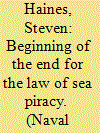

|
|
|
| 15 |
ID:
103006
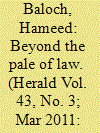

|
|
|
| 16 |
ID:
075228
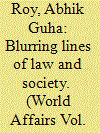

|
|
|
|
|
| Publication |
2006.
|
| Summary/Abstract |
In a global system in which economic liberalism reigns supreme, law can only become an instrument to facilitate trade, as the internationalisation of intellectual property rights shows. Abhik Guha Roy points out that the legal system is increasingly used in the service of dominant business interests at the expense of true social justice. Will this evolution of legal concepts lead to a worldwide revolt against the contemporary notion of law?.
|
|
|
|
|
|
|
|
|
|
|
|
|
|
|
|
| 17 |
ID:
094592
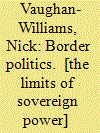

|
|
|
|
|
| Publication |
Edinburgh, Edinburgh Unitversity Press, 2009.
|
| Description |
ix, 190p.
|
| Standard Number |
9780748637324
|
|
|
|
|
|
|
|
|
|
|
|
Copies: C:1/I:0,R:0,Q:0
Circulation
| Accession# | Call# | Current Location | Status | Policy | Location |
| 054844 | 320.12/VAU 054844 | Main | On Shelf | General | |
|
|
|
|
| 18 |
ID:
153425


|
|
|
|
|
| Summary/Abstract |
The bureaucratic politics model of foreign policy decision making is predicated in large part by Miles' Law, which states that “where you stand depends upon where you sit.” That is, an actor's policy preferences can be predicted from his or her governmental position or role within the bureaucracy. Consequently, secretaries of state in the U.S. foreign policy decision-making process are then presumed to favor policy options emphasizing diplomacy and civilian efforts. However, Hillary Clinton has proved to be a consistent hawk during her tenure as secretary of state. Specifically, she was one of the strongest advocates of the use of military force in both Afghanistan and Libya. This paper examines Clinton's policy preferences in the context of the Afghanistan troop surge and the U.S. role in the international military operation in Libya to probe whether the secretary's failure to conform to Miles' Law is an anomaly or presents important questions regarding the possible disjunction between institutional and individual interests and their respective influences on actors' policy preferences.
|
|
|
|
|
|
|
|
|
|
|
|
|
|
|
|
| 19 |
ID:
170399
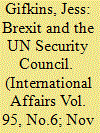

|
|
|
|
|
| Summary/Abstract |
The United Kingdom's decision to leave the European Union has ramifications beyond the UK and the EU. This article analyses the impact of the Brexit referendum on the UK's political capital in the United Nations Security Council; a dimension of Brexit that has received little attention thus far. Drawing on extensive elite interviews we show that the UK has considerable political capital in the Council, where it is seen as one of the most effective actors, but the reputational costs of Brexit are tarnishing this image. With case-studies on the UK's role in Somalia and Yemen we show how the UK has been able to further its interests with dual roles in the EU and Security Council, and the risks posed by tensions between trade and human rights after Brexit. We also analyse what it takes to be influential within the Security Council and argue that more attention should be paid to the practices of diplomacy. Influence is gained via penholding, strong diplomatic skill and a well-regarded UN permanent representative. The UK accrues political capital as a leader on the humanitarian and human rights side of the Council's agenda, but this reputation is at risk as it exits the EU.
|
|
|
|
|
|
|
|
|
|
|
|
|
|
|
|
| 20 |
ID:
098011
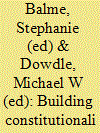

|
|
|
|
|
| Publication |
New York, Palgrave Macmillan, 2009.
|
| Description |
viii, 325p.
|
| Series |
Science po series in international relations and political economy
|
| Standard Number |
9780230600324, hbk
|
|
|
|
|
|
|
|
|
|
|
|
Copies: C:1/I:0,R:0,Q:0
Circulation
| Accession# | Call# | Current Location | Status | Policy | Location |
| 055141 | 342.51/BAL 055141 | Main | On Shelf | General | |
|
|
|
|
|
|
|
|
|